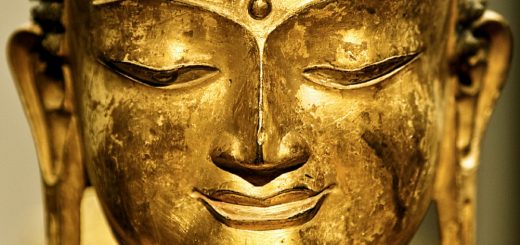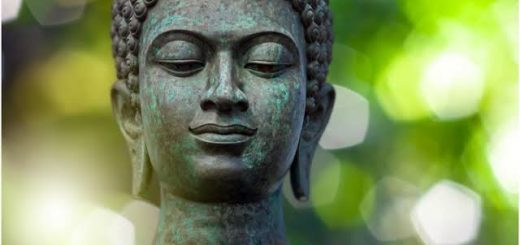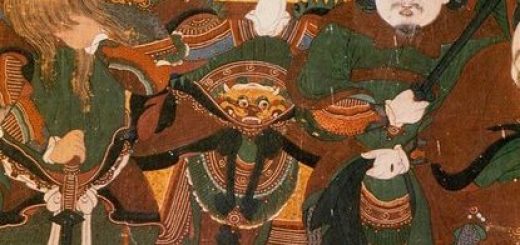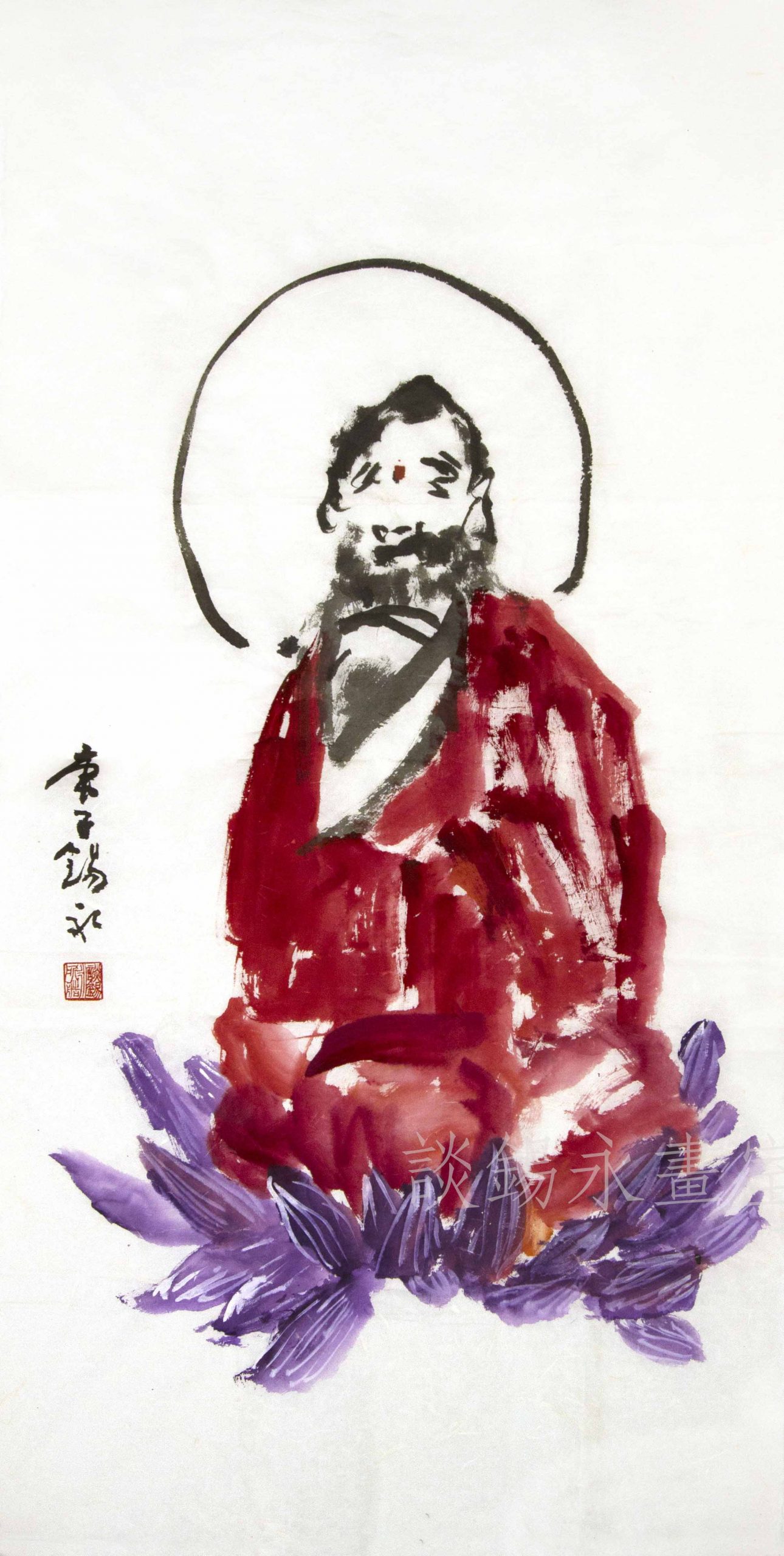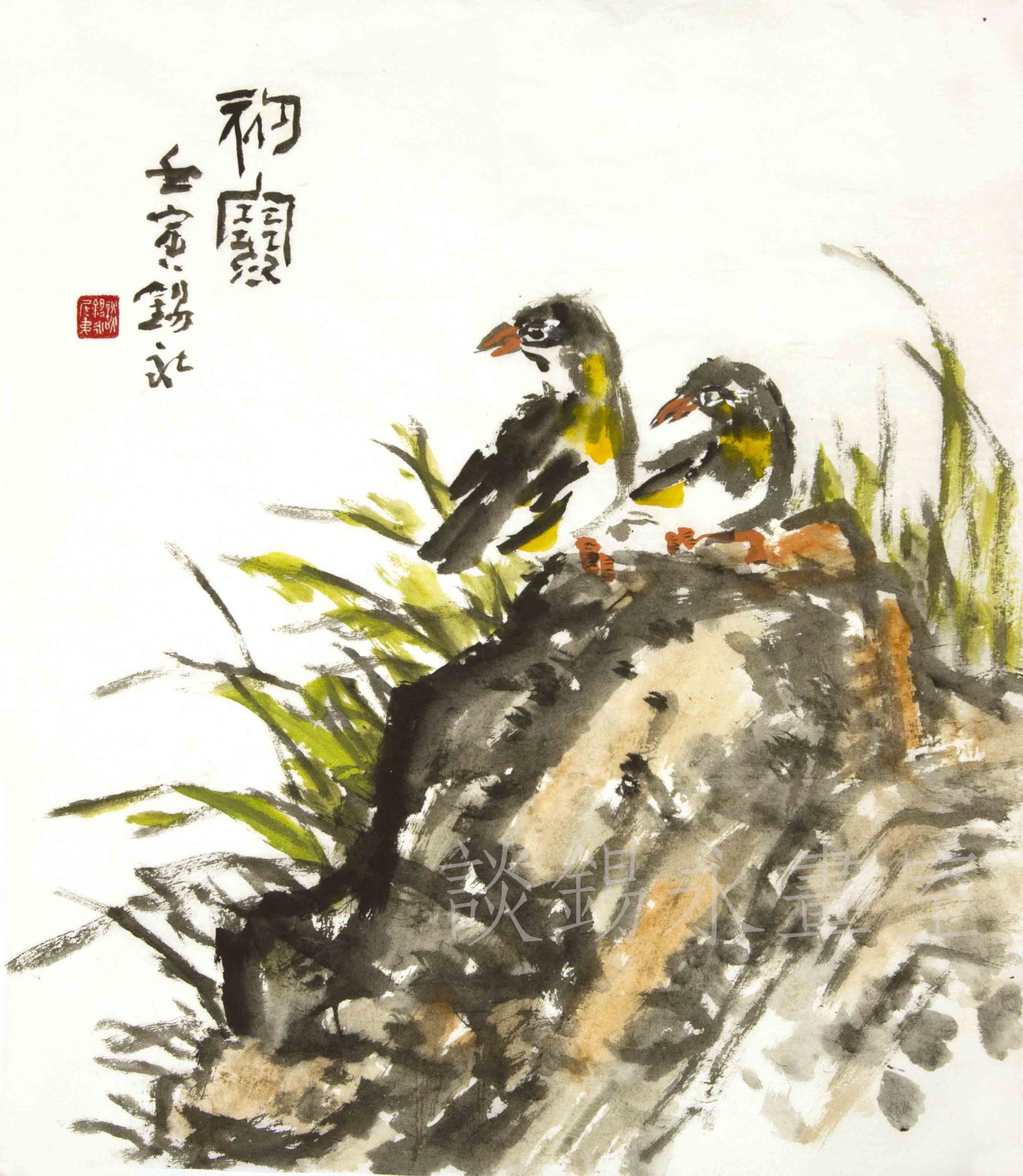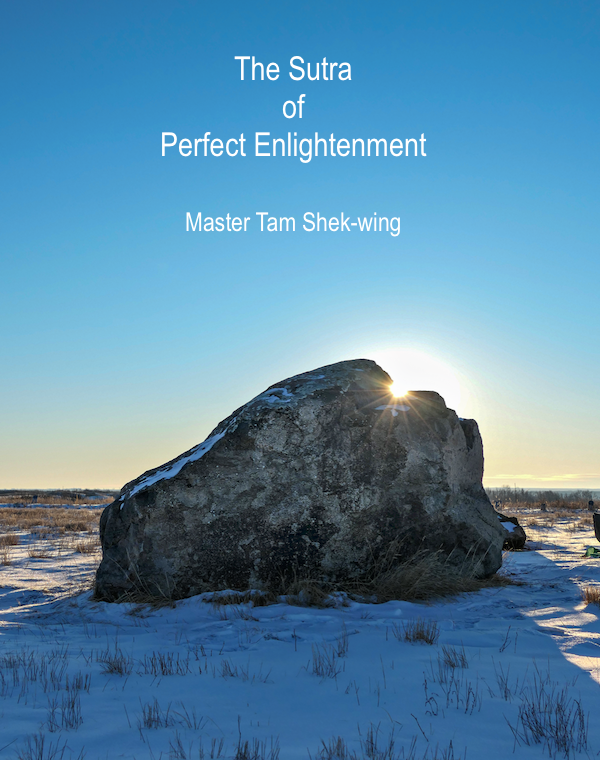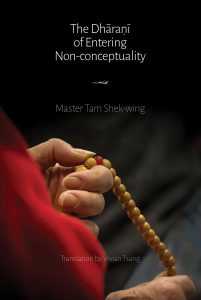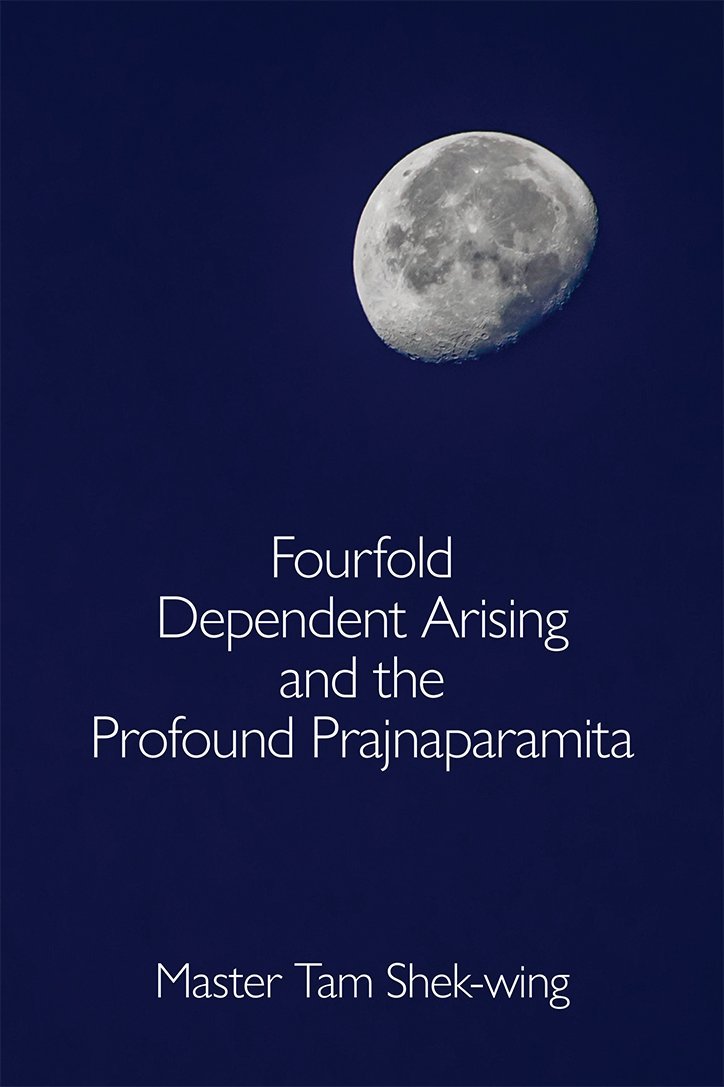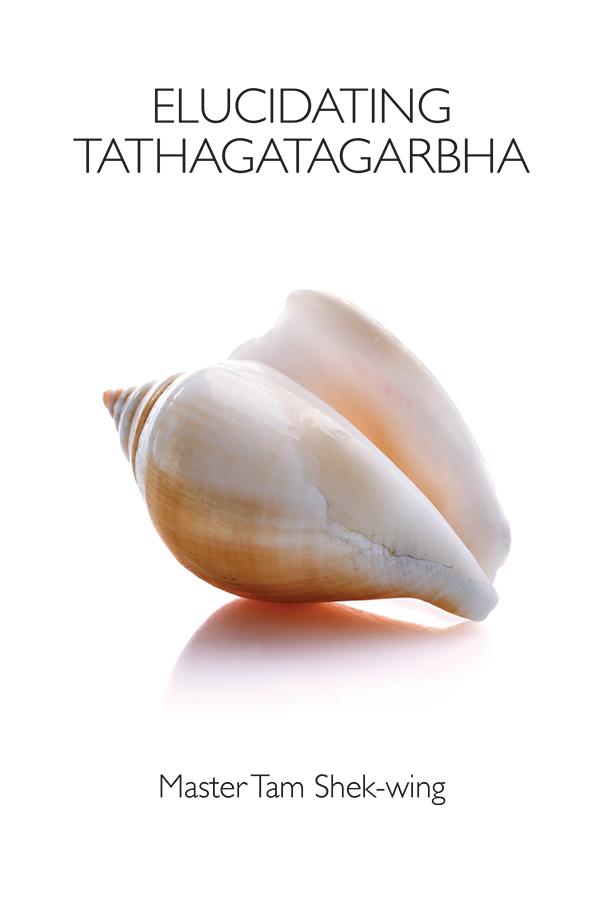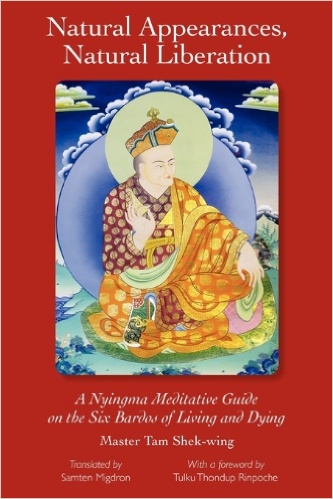Perfect Enlightenment 35: Dissemination
Show scripture (Chinese). 於是賢善首菩薩在大眾中即從座起,頂禮佛足右遶三匝,長跪叉手而白佛言:「大悲世尊!廣為我等及末世眾生,開悟如是不思議事。世尊!此大乘教名字何等?云何奉持?眾生修習得何功德?云何使我護持經人?流布此教至於何地?」作是語已五體投地,如是三請終而復始。 爾時,世尊告賢善首菩薩言:「善哉!善哉!善男子!汝等乃能為諸菩薩及末世眾生,問於如來如是經教功德名字。汝今諦聽!當為汝說。」時,賢善首菩薩奉教歡喜,及諸大眾默然而聽。 「善男子!是經百千萬億恒河沙諸佛所說,三世如來之所守護,十方菩薩之所歸依,十二部經清淨眼目,是經名大方廣圓覺陀羅尼,亦名修多羅了義,亦名祕密王三昧,亦名如來決定境界,亦名如來藏自性差別,汝當奉持。善男子!是經唯顯如來境界,唯佛如來能盡宣說;若諸菩薩及末世眾生依此修行,漸次增進至於佛地。善男子!是經名為頓教大乘,頓機眾生從此開悟,亦攝漸修一切群品。譬如大海不讓小流,乃至蚊虻及阿修羅飲其水者,皆得充滿。 「善男子!假使有人純以七寶積滿三千大千世界以用布施,不如有人聞此經名及一句義。善男子!假使有人教百恒河沙眾生得阿羅漢果,不如有人宣說此經分別半偈。善男子!若復有人聞此經名信心不惑,當知是人非於一佛二佛種諸福慧,如是乃至盡恒河沙一切佛所種諸善根聞此經教。汝善男子!當護末世是修行者,無令惡魔及諸外道惱其身心令生退屈。」 爾時,會中有火首金剛、摧碎金剛、尼藍婆金剛等八萬金剛并其眷屬即從座起,頂禮佛足,右繞三匝而白佛言:「世尊!若後末世,一切眾生有能持此決定大乘,我當守護如護眼目;乃至道場所修行處,我等金剛自領徒眾晨夕守護,令不退轉。其家乃至永無災障,疫病銷滅,財寶豐足常不乏少。」 爾時,大梵天王、二十八天王并須彌山王、護國天王等即從座起,頂禮佛足,右繞三匝而白佛言:「世尊!我亦守護是持經者,常令安隱心不退轉。」 爾時,有大力鬼王名吉槃茶與十萬鬼王即從座起,頂禮佛足,右繞三匝而白佛言:「世尊!我亦守護是持經人,朝夕侍衛令不退屈,其人所居一由旬內,若有鬼神侵其境界,我當使其碎如微塵。」 佛說此經已,一切菩薩、天龍、鬼神八部眷屬及諸天王、梵王等一切大眾,聞佛所說,皆大歡喜,信受奉行。 Show scripture (English). Then the bodhisattva Most Excellent of Worthies arose from his seat in the great assembly. He bowed his head to the feet of the Buddha and circumambulated him three times to the right. He then knelt down with his hands clasped and addressed the Buddha, saying: “Greatly Compassionate World Honoured One. You have revealed extensively for us and sentient beings of the degenerate age about this inconceivable matter. World Honoured One: What names are applied to this Mahayana teaching? How should it be cleaved to and practiced? What kinds of merits will be obtained by sentient beings who practice according to it? How shall those who cleave to and practice it be protected? And to what lands should this teaching be propagated?” Having said this, he prostrated fully to the ground. He repeated this question three times in succession. Then the World Honoured One, addressing the bodhisattva Most Excellent of Worthies said: “Excellent! Excellent! Good Son, you have asked well for the bodhisattvas and sentient beings of the degenerate age about the merits and names of this sutra teaching. Now listen well, and I shall explain for you.” The bodhisattva Most Excellent of Worthies received this instruction with great joy. Those in the great assembly became silent and listened. “Good sons, this scripture is that which is taught by billions upon billions of countless buddhas; it is that which is protected by the tathāgatas of the three times; it is that which is relied upon by the bodhisattvas of the ten directions; it is the pure eye of the twelve divisions of the scriptures. This scripture is called The Great Extensive Perfect Enlightenment Dhāraṇī; it is also called The Sūtra of the Definitive Meaning; it is also called The Ultimate Mystery of Samādhi; it is also called The Tathāgata’s Realm of Certainty; it is also called The Distinction of the Self-Nature of the Tathāgatagarbha. You should cleave to it and practice according to it.” “Good sons, this scripture expresses nothing but the realm of the Tathāgatas, and only the Buddha-Tathāgatas are able to fully explain it. If the bodhisattvas and sentient beings of the degenerate age practice according to this sutra, they will gradually advance to Buddhahood.” “Good sons, this scripture is called the Sudden Teaching of the Mahayana, and sentient beings with the capacity for the sudden will awaken through it. But it also embraces the gradual practice of all sentient beings. It is like a great body of water which does not deny the entrance of any small stream; and mosquitoes and horseflies, as well as asuras may drink its water and take their fill.” “Good sons, say for instance there were a man, who with the purest of motivations, gathered the seven jewels in a quantity sufficient to fill three thousand galaxies, and then gave them all away for charity. This man’s merit would not be equal to that of a man who heard the name of this scripture and understood the meaning of a single passage. Good Sons, say for example there was a man who taught sentient beings as many as a hundred times the amount of the grains of sand in the Ganges river such that they all attained the level of arhat. This man’s merit would not be equal so someone who explicated a half of a gatha of this scripture. If there is any person who hears the name of this sutra and believes in it fully without a shadow of a doubt, then you can know that this person has not only sown the seeds of blessings and wisdom with one buddha or two buddhas, but has cultivated his roots of goodness with countless myriads of buddhas, listening to this sutra-teaching.” “Good sons, you should protect sentient beings of the degenerate age who are practicing this, and not let evil spirits and heretics upset their thoughts or cause them to lose heart.” Then, from the midst of the great assembly, arose Fiery-haired Vajra-warriors, Pulverizing Vajra-warriors, Blue Vajra-warriors—altogether eighty thousand Vajra-warriors together with their retinues. They got up from their seats, bowed their heads to the feet of the Buddha, and circumambulated him three times to the right. Then they addressed the Buddha, saying “World Honoured One, if sentient beings of the degenerate age are able to cleave to this Scripture of Mahayana Decisiveness, we shall protect them, as if protecting our own eyes and we shall protect as well the places where they carry out their practice. We Vajra-warriors shall guide these people, protecting them morning and night, such that they do not retrogress. Their households shall never suffer from calamity; sickness shall be eradicated; their material possessions shall be abundant and they shall never suffer from poverty.” Then the Great Brahma Kings, the Kings of the Twenty-Eight Heavens, together with the Kings of Mt. Sumeru and the Nation-Protecting Kings, arose from their seats. They bowed their heads to the Buddha’s feet, circumambulated him to the right, and addressed him, saying: “World Honoured One, we shall also protect those who cleave to this scripture. We shall bring them tranquillity and not allow them to retrogress.” Then a Great Mighty Demon King, whose name was Kumbhanda, together with a hundred thousand Demon Kings, arose from his seat. He bowed his head to the Buddha’s feet and circumambulated him three times to the right. He addressed the Buddha, saying: “I shall also protect those who cleave to this scripture by guarding them morning and night and not letting them retrogress. If an evil spirit should dare to approach within the area of ten miles to the place of the practitioner’s abode, I shall smash him to atoms.” The Buddha having finished his preaching of this scripture, the bodhisattvas, the devas, nagas, raksas and the rest of the eight kinds of spiritual beings along with their retinues, as well as the Heavenly Kings, Brahma Kings and the rest of the great assembly, having heard what the Buddha taught, were all filled with great joy. They believed, embodied and practiced. Now Buddha had completed the instructions, we have arrived at the concluding section on dissemination. This section opened with bodhisattva Most Excellent of Worthies praising this sūtra for its revelation to all sentient beings on the inconceivable practice to enlightenment. He then proceeded to ask Buddha: The five questions are in essence on the dissemination of this teaching. Buddha began by praising this sūtra by saying that “this scripture is that which is taught by billions upon billions of countless buddhas,” that this scripture is not Buddha’s teaching, but rather, the teaching of all buddhas would be equivalent to the teaching of this scripture, and therefore, “it is that which is protected by the tathāgatas of the three times; it is that which is relied upon by the bodhisattvas of the ten directions; it is the pure eye of the twelve divisions of the scriptures.” (One can based on the teaching of this scripture to gain an understanding to the sayings in the twelve divisions of scriptures.) On the title. 1. On the title. The scripture was said to have five names: The Great Extensive Perfect Enlightenment Dhāraṇī; The Sūtra of the Definitive Meaning; it is also called The Ultimate Mystery of Samādhi; The Tathāgata’s Realm of Certainty; The Distinction of the Self-Nature of the Tathāgatagarbha. Dhāraṇī refers to the method, to call it Definitive is to distinguish it from the non-definitive scriptures, to call it the ultimate mystery of samādhi is the practice of samādhi, to call it tathāgata’s realm of certainty is to illustrate the realm of realizing perfect enlightenment, to call it the distinction of the self-nature of the Buddha-Within is to say that the inherent nature of the Buddha-Within is Buddha-nature, tathāgata’s dharmakaya. On embodying the practice. 2. On the embodiment of the practice. First determine that the scripture is a Mahāyāna scripture of sudden teaching, that it presents a way for sentient beings to sudden awakening. If there is not sudden awakening, a gradual practice will also lead to Buddhahood. This means it is inclusive of all sentient beings, like a great body of water which does not deny the entrance of any small stream. On the merits of the practice. 3. On its merits. It is said to have heard of its name and the meaning of a line, its merits is beyond the charity of giving away the seven jewels in a quantity sufficient to fill three thousand galaxies; it is said the merits of half a verse is beyond the merits of a hundred times the amount of the grains of sand in the Ganges river such that they all attained the level of arhat; it is said those who have complete faith through the title have attained the blessings and wisdom of not one, not two, but countless number of buddhas who have cultivated blessings and wisdoms. This refers to the cultivation of two merits. On protecting and maintaining the practice. 4. On protecting and maintaining the practice. One protects sentient beings of the degenerate age who are practicing this by not letting evil views and afflictions upset their thoughts or cause them to lose confidence. This was when Fiery-haired Vajra-warriors rose from their seats and vowed to protect practitioners who are determined in the Mahāyāna practice, “as if protecting our own eyes,” all the way to protecting the places of practice, such that “their households shall never suffer from calamity; sickness shall be eradicated; their material possessions shall be abundant and they shall never suffer from poverty.” In turn, the Heavenly Kings and the Demon Kings all rejoiced and vowed to protect the practice. On dissemination. 5. On dissemination. The scripture says, “The bodhisattvas, the devas, nagas, raksas and the rest of the eight kinds of spiritual beings along with their retinues, as well as the Heavenly Kings, Brahma Kings and the rest of the great assembly, having heard what the Buddha taught, were all filled with great joy. They believed, embodied and practiced.” This refers to the dissemination of this scripture. Now it is in circulation among humans for the practice and observation of perfect enlightenment, to directly realize the realm of dharmakaya, the awareness of perfect enlightenment, which is the realm of Buddha-Within. May the readers make good use of it. My brief commentary of this scripture ends here. It is not without mixed feelings. Buddhism was disseminated to China at the beginning of Han dynasty (202 BCE – 220 CE) and gradually took shape in the Wei-Jin dynasties (魏晉六朝). Buddhism that was taught at the time most like had the basis of Tathāgatagarbha for view, meditation, practice, and fruition, which became the tradition. While the tradition tended to fall within Other Emptiness, this is not necessarily a flaw, for one must go through the stage of Other Emptiness to proceed to the ultimate. Therefore, Other Emptiness is not a mistaken view; at the most, one can say it is not the ultimate. Tibetan Buddhism began in the Tang dynasty in China, and was heavily influenced by the Chan tradition. The teachings of Padmasambhava and Vimalamitra can coalesce well with the teachings of the Chan tradition, for they both take the Tathāgatagarbha as the practical fruition. Therefore, scholars of Sino-Tibetan Buddhism must consider Tathāgatagarbha in the study. To directly realize Tathāgatagarbha, one should know that this is the realm of awareness of perfect enlightenment. However, now we have come to the latter days of dharma, many who teach Sino-Tibetan Buddhism no longer discuss perfect enlightenment, and many fall into sectarian views, hampered by consciousness-only, or dependent origination, or imitation prajnaparamita, or even imitation Tathāgatagarbha. They cite the scriptures in their discussion and appear very reasonable. If one can read this scripture carefully, to appreciate Buddha’s guidance to perfect enlightenment, then one would discard all sectarian views to follow the key points to the stages of practice. Perhaps there would be a reversal of fortunes to the corruption of dharma. This is my hope. I am without merits in terms of the view and the practice. If the reader considers otherwise, then you would appreciate my purpose to make observations. Auspicious. This book was written originally as an online weekly column. Now collected into a book, the intent is to promote this scripture. It used to be a widely disseminated scripture, but because some has deemed it a forgery, fewer and fewer are interested in it. What is preached in this text has far-reaching impact, not only impacting Chan and Huayan traditions in China, but also Pure Land, Vinaya, Tiantai and Vajrayāna. It is also a fundamental text to many Tibetan tantric traditions. With the Japanese casting doubt into its authenticity, it is no different from rejecting Śūraṅgama-sūtra, severely damaging the Buddhist practice. It is the wish that the book can arouse the correct faith in the readers. The scripture says, ““Good sons, you should protect sentient beings of the degenerate age who are practicing this, and not let evil spirits and heretics upset their thoughts or cause them to lose heart.” This was Buddha’s solemn advice. May the readers consider its significance. In the year of Dingyou (2017), on the day of Laba (臘八), the day of Buddha’s enlightenment, Dorje Jigdral Tam Shek-Wing completed the commentary. May whatever miniscule merits be dedicated to all sentient beings attaining Buddha’s blessings and empowerment. May all things be auspicious.Chinese:
English:
Commentary:
